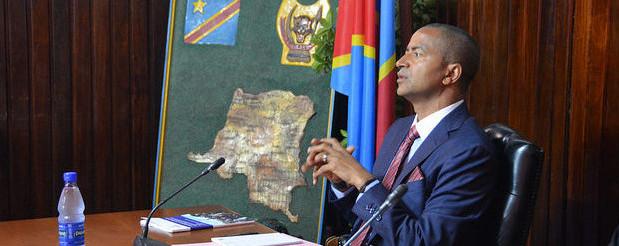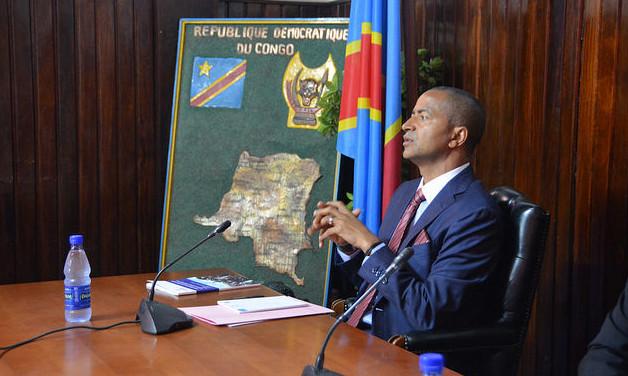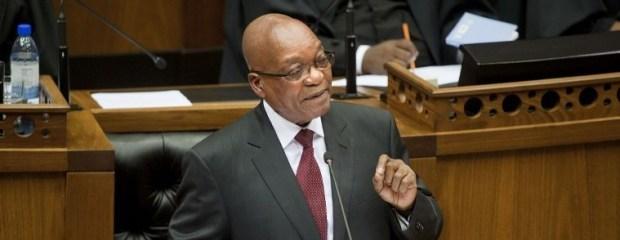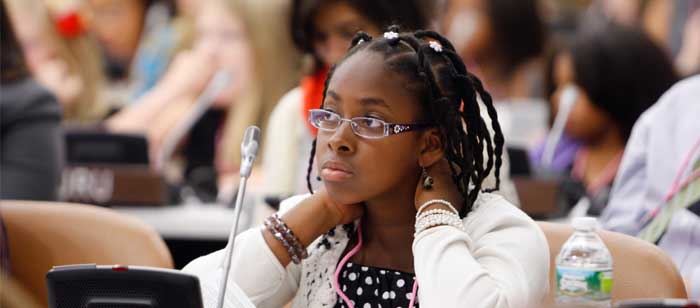Congo’s Katanga Governor Moïse Katumbi leaves ruling party, breaks silence

Katanga’s popular governor Moïse Katumbi could be the one politician able to mobilise enough votes across the DRC to challenge President Kabila.
After a long silence, Moïse Katumbi has finally spoken out. On 29 September, the celebrated governor of the Democratic Republic of Congo’s (DRC) Katanga province announced his resignation from the People’s Party for Reconstruction and Democracy (PPRD), the country’s main ruling party led by President Joseph Kabila.
The DRC is in the middle of a complex electoral process where the key question is whether Kabila will leave office in 2016. Kabila has been in power for 14 years, and according to the constitution, he will not be eligible to run for elections once his two terms as elected president come to a close next year. However, that has not stopped him trying to circumvent these provisions.
Indeed, in Katumbi’s declaration, the governor strongly condemns recent attempts by the regime to change the constitution or delay elections to prolong Kabila’s reign. He also criticises the arbitrary arrests of pro-democracy activists as well as increased intimidation and repression. And he calls on the Congolese people, political parties, and civil society to fight against fatalism and to help save the DRC’s young democracy.
A challenger to Kabila?
Although born in South Kivu, Kabila’s home province is Katanga. And through 2014, the president witnessed as public opinion in the region increasingly moved away from him. By the end of the year, Katumbi, who has been governor of the province since 2007, was distancing himself from Kabila too.
In December 2014, coming back from a long absence abroad, Katumbi indicated in some of his speeches that he was against Kabila presenting himself for a third mandate. The governor raised expectations in his public speeches in December 2014 and early 2015, but remains quiet about any presidential ambitions he may have.
At the end of February, Katumbi met with Kabila and they talked for more than two hours in private. Following this, different versions of what was said emerged, but what the various accounts have in common is that: 1) Kabila proposed something concrete to Katumbi (though what this was depends on which version of events you trust); 2) Katumbi refused; and 3) both leaders agreed not to air their disputes in public.
Katumbi, for instance, has not openly criticised découpage, the policy of splitting up of the DRC’s 11 provinces in 26. Although this idea was mandated in the 2006 constitution, Kabila’s recent drive to implement the move has been widely interpreted as a way to disempower Katumbi by breaking up the huge, copper-rich Katanga province and his authority over it.
Kabila has also engaged in other tactics to undermine the popular governor. In June 2015, the president filed a criminal complaint against more than a dozen current and former government officials for fraud and corruption, including Katumbi. This initiative hasn’t been taken further since June, but it hangs like a Damocles’ Sword above Katumbi’s head, presumably to be dropped in the event that he decides to lead an opposition faction. With yesterday’s declaration and Katumbi’s departure from Kabila’s party and presidential majority, this eventuality seems a little closer.
Great looks, dark shadows
As governor of Katanga, Katumbi has been is responsible for positive changes and new dynamics in the province. He has a good reputation as businessman and manager, and is seen to be generous. He also has the money and looks for a great campaign. He is charismatic and has cleverly used his success in football and development to feed into his political ambitions. In fact, Katumbi is currently seen as one of the few – if not the only – politician who might be able to mobilise a considerable electorate in most of the country’s 26 provinces.
However, Katumbi also has a many elements playing against him. There are some dark shadows hanging over his business past, he might not have the strength of personality to be a leader, he is not considered to be a sophisticated intellectual or visionary, and he has a lot of adversaries in Katanga. The business community of the province complains that he uses his political mandate to reinforce his economic empire and acquire as many commercial monopolies as possible. And the fact that his father is Jewish is also likely be used against him in some way.
The question now is of how Katumbi will position himself on the political chessboard. He will certainly need strong alliances if he wants to present himself as the leader of a credible and sustainable process of change.
Whatever happens next, Katumbi’s declaration ends a turbulent September for President Kabila. Earlier this month, the opposition UDPS party broke off negotiations with the government over conditions for a national dialogue regarding the electoral process. Meanwhile, seven senior political figures, some close to Kabila, signed an open letter urging Kabila to respect the constitution. The politicians, who were the leaders of a group of parties within the ruling coalition known as G7, were later expelled.
The combined effect of these events is nothing less than an earthquake which could redraw the vast DRC’s political landscape.
Kris Berwouts (Ghent, 1963) studied African linguistics and history. He worked over 25 years for a number of different Belgian and international NGOs focused on building peace, reconciliation, security and democratic processes. Since January 2012, he works as an independent writer and expert on conflict, security and democratization in Central Africa. He can be followed on Twitter @KrisBerwouts.








“And the fact that his father is Jewish is also likely to be used against him in some way.” What ways?
Is Kris Berwouts suggesting that the Congolese are anti-Semitic? If so, this statement deserves to be expanded. If not, then it should be retracted.
If Katumbi is as popular as Berwouts claims, why would the fact that his father is Jewish be an issue now? This is not new knowledge.
I don’t want to suggest the Congolese are anti-semitic. There is no indication for that. But in a conuntry where people’s real or alleged origins are used by political adversaries to damage politicians (as it has been the case with Kabila, Kamerhe and others), it is extremely likely that the non-Congolese part of Katumbi’s roots will be used against him in a campaign.
And Katumbi’s popularity: you can’t say that Katumbi is popular outside Katanga, but for the reasons I mention he has the potential to mobilize an important political base/ electorate in the different parts of the country.
We should note that it is the fact that Katumbi is born of a foreign father that might be a problem for some Congolese, not the fact that his father was Jewish. Katumbi is after all a native Congolese.
I sincerely hope that everybody will agree with you. I do.
This also came up in the case of Kengo wa Dondo (born Leon Lubicz /Léon Lubitsch in 1935) who changed his name in 1971 – as did several others with a non-African ancesty (e.g. Portuguese… or Belgian) in the heyday of “authenticité”…
DRC civic social publics are rarely benign in that politics in DRC is alas equal to a ‘money machine’ at the expense of the most excellent citizens who for the greater part are denied opportunity. In DRC there is an acute lack of medical health care service, potable water is scarce and the education system is berift of any prescriptive value. DRC is in acute fundamental need of a radical transformative shift in governance. Kabila and his gang of miscreants must go! Any person affiliated with Kabila ought not to consider seeking public office. The civic civil social public slate must be cleansed utterly from all past anteceedents. The next cadre of DRC Leadership ought and must consider only what is in the best interests of DRC which means that personal public exploitation must not be presumed—-ever! The rule of law process and procedure must be respected which means that Kabila will be forced to vacate the Office of President in 2016 as clearly expressed in the DRC Constitution. Any amendment to this must not be considered. DRC is in dire need of political social stability where the fundamental ontological issues are addressed and agreed that this is and will be a long term process. However, monies must be deployed most immediate into healthcare and into the strengthening of education from junior school and on up to the University levels of study. The next leadership cadre must be committed to the proposition of strict public service and accountability to the citizens of DRC.
At present I am in DRC attempting to move the civic civil social public conversation.
Great article, all point mentioned makes quit some sense. I’ll like to articulate on the part of Katumbi’s father being “Jew”, mentioning the Jew part might not be accurate because we Jean bamanisa also with a parent that is not congolese origin.
The problem, largely have to do with some individuals with less documented congolese origin, take jose endundo, who have a well documented history of his life in DRC, that includes Katumbi’s brother Katebe-Katoto.
People in DRC don’t question someone with well documented congolese origin. Ain’t like J.Kabila and Kamerhe its their lack of documented congolese origin that people questions more relatively people who have some back ground or extensive relationship with rwanda. Ruberwa, Nyarugabu, J.Kabila, Kamerhe, Kengo ect.. The list is long.
Moise kayumbu is a pure congolaise, peoples of congo want him to be a president of the republic and it will happen like or not. We all as congolese looking forward to katumbi mission to leaft the country up. Viva moise katumbi.
Having been entrusted with leadership of Katanga for the years, has been in sports leadership and business etc Katumbi has proved his patriotism as Congolese. Compare this to Obama born to a Kenyan father but has led America to greater hights
Katumbi is certainly popular with some people in Katanga – mostly football fans. But he has alienated many people, especially business people, with his malpractice.
Furthermore, I do not think that he’s got what it takes to become president…correction: given the case of the DRC, he does have what it takes: money. But being wealthy does not necessarily ensure that he will be a good leader.
He might, in my humble opinion, use his popularity to garner votes in several provinces, but these would essentially go to one of the G7 people…
For me Katumbi deserves to be our president no matter critics of some individuals, of cause none is perfect but surely even his records speak especially When you try to compare today’s Katanga province and our past Katanga they are totally different and these are results of good governance which does not tolerate corruption which have undermined all government institutions in our country.
Moose katumbi is half Jewish. That should count in his favour and not against him. He should be able to mobilise votes from all over Dr Congo.
Moise Katumbi is not the savior or Congo quite the opposite. He is the worst thing that can happen to you.
Moise Katumbi is as empty of hope as Obama. He represents imperialism at his paroxysm and he will be selling out congo to international companies even faster if he becomes presitent. Congolese people you need to stop valuing everything from the superficial level, he gives you mazembe and dons nices suits and looks like obama you think he loves you huh.. Elect this man at your own risk. Moise Katumbi being jewish should not play in his favor either… he is not a good representative of a native congolese who keeps the matter of the simple people clost to heart.. he is not the right choice sorry but you think you hate Kabile, go with this con artist right here… and see how things work out for you